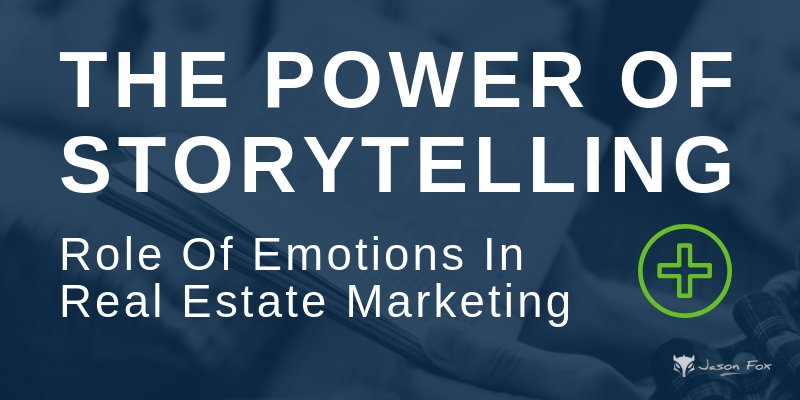In every aspect of our lives, emotions guide our decision-making processes much more profoundly than we realize or care to admit. Marketers have relied on this simple truth for ages to sell their products.
Emotions go hand-in-hand with stories. In an oversaturated market where the quality of products is normative, consumers are seeking an emotional connection with a brand. They crave the human touch of stories to influence their buying decisions.
Thus, we’ve entered an era of marketing where everything from hygienic products to cars is being advertised through storytelling.
But advertising real estate is not like advertising cars, although there are a few similar components.
What’s so special about real estate marketing?
When you’re selling products, getting a consumer to choose you over the competitor is less about the product itself, and more about your brand story. The way you advertise your products reflects the values of your brand and the emotions you want consumers to associate with it.

Courtesty of: Sean Loyless
A good example is the whole “Coke and Pepsi” conundrum, where there’s hardly any difference between the products. Yet, consumers are compelled to choose one over the other as they get attached to the brand.
Furthermore, these stories need to be weaved so that they convey to the audience how the product may fit into their lives.
Whereas with real estate, not only is each property unique, but it doesn’t need to fit into their lives – it’s what they’ll create their lives around.
It’s the dream of a bright and harmonious future. It’s the place where they will live their most private moments, celebrating the good and finding refuge when life gets tough.
It’s home.
Undoubtedly, storytelling has always been the lifeblood of the real estate industry. But there’s no denying that the possibilities were significantly limited prior to the digital era. After all, it’s not that long ago that real estate listings were faceless, bland descriptions of properties.
With the advent of sophisticated content marketing strategies, agents now have more resources and platforms at their disposal to tell genuine stories and get them heard.
Work closely with property owners
Sure, digging out a genuine story for each and every property is no easy task. The emphasis is on “genuine”.
If your property descriptions are mostly similar, whether in wording or in the very concept, you’re not telling any particular story – you’re just marketing a property for sale.
[click_to_tweet tweet=”In order to leverage the power of storytelling in content marketing and real estate listings, you need to learn the unique history of each property. #realestatestorytelling” quote=”In order to leverage the power of storytelling in content marketing and real estate listings, you need to learn the unique history of each property.” theme=”style3″]
Of course, it’s common practice for real estate agents to note anything significant. It might be an interesting history that will contribute to the property’s value – perhaps a famous person living there at some point or the place partaking in local history.
That’s a no-brainer, and it’s great material to make your potential clients feel inspired.
But what happens when there’s nothing interesting to note?
Stories are everywhere around us and they’re rooted in ordinary life. Walk through the house with the seller and let them tell you their story – the memories that are tied to each room.
Naturally, you won’t be telling your clients about the personal recollections of the seller, but you’ll have a better feel for the uniqueness of the property.
You’ll comprehend each space beyond its physical attributes. Essentially, by getting a feel for how that property contained someone’s life, you’ll be able to give life to the home through images and write compelling descriptions.
That brings us to the next part.
Influence positive emotions
As an agent, you’re skilled at noticing and accentuating a home’s best qualities. But rather than listing them in a sales-pitch manner, use those qualities to create a narrative.
This is where you use storytelling to inspire clients’ imagination and influence positive emotions.
For example, a fireplace is not just a fireplace – it’s where the stockings will hang on Christmas Eve or where the family gathers on chilly autumn nights.
A spare bedroom is where your friends and relatives will stay after birthday celebrations and family milestones… or it could be a home office for the prospect that dreams of starting their own home business someday.
The kitchen is the heartbeat of the home, a place where everyone will gather to cook together on holidays.
The idea is to influence your audience’s perspective to see beyond the ordinary, and this storytelling approach doesn’t pertain solely to real estate listings. From the “about” section of your website to your social media presence, seek to inspire positivity.
Build authority
As I’ve stated previously, you’re part of the story too. You, as a person and a professional, play a major role in the larger narrative that influences a client’s decision.
The vast digital space offers so many valuable storytelling opportunities to leverage social proof, build authority, and establish trust. Use social media to tell inspiring stories of success as well as more personal stories unrelated to business.
Feature case studies on your website, and weave them into a story-like structure.
Keep in mind that you’re also competing for authority, attention, and relevance with a myriad of media companies that are offering useful information to your target audience.
Investing in a serious content marketing strategy and offering free resources on your website is also a valuable tactic that helps you build a loyal consumer base.
Choose your words
Here’s something that stand-up comedians and real estate agents share: their success depends on the way they tell their stories.
[click_to_tweet tweet=”Here’s something that stand-up comedians and real estate agents share: their success depends on the way they tell their stories. #realestate” quote=”Here’s something that stand-up comedians and real estate agents share: their success depends on the way they tell their stories.” theme=”style3″]
If you’re not keen on putting your writer’s cap on, by all means, find professionals to help you. Just make sure that the person or people you’re hiring have knowledge of your industry as well as creative talent.
A gifted storyteller isn’t only someone who is crafty with words and imagery, but someone who has the unique ability to uncover the extraordinary within the ordinary.
Modern-day consumers are wise to cliché marketing phrasing and false sentiment. Although it might not drive them away entirely, they certainly won’t take you very seriously if you describe every small house as “cozy and intimate” and every weekend cabin as “the ideal family getaway”.
Leverage different mediums
Don’t hesitate to go beyond the written word and try new tools to help you weave a compelling narrative. For example, video is a powerful storytelling tool, and it is outrageously growing in popularity among audiences as well as marketers.
As a medium, video corresponds very naturally with the real estate industry – most notably because it helps overcome the issue of perception in property listings and helps audiences acquire a more complete image.
If you haven’t dipped your toe in the waters of this convincing medium yet, use this guide for getting started with video marketing.
You can use video for different purposes – to showcase testimonials, walk through a property, share valuable resources with your audience, etc. It’s also a great tool for running agency promotions or presenting yourself because it gives you more expressive room to tell the story of your business.
But don’t forget that stories are not present just in literal advertisements and content. Everything from how your website is designed to the way you choose to visually present a property plays into a specific context.
Make sure your website is designed to reflect your brand persona. It’s the digital face of your business, where the web copy, images, and overall design evoke specific emotions and play into your brand story. The image you convey through your website will have the biggest influence on lead generation.
Conclusion
Humans have been intrinsically drawn to storytelling since prehistoric times. We’ll never stop seeking them out, in our everyday lives and gathered around the proverbial fireplaces in the corners of the digital landscape.
As a real estate agent, the story you’re weaving is that of lifestyle and the ethereal feeling of belonging. But you’re not only the storyteller – you’re part of the narrative too.

Written by : Natasha Lane
Natasha is a lady of a keyboard whose fields of expertise could be summed up in digital marketing, business and IT related topics. Although she is primarily content creator for DesignRush, a B2B marketplace connecting brands with agencies, Natasha is always happy to collaborate with awesome blogs and share her knowledge. To see what she is up to next, check out her Twitter Dashboard.



Great article.
Storytelling is the key in real estate but along with that you need to have an in-depth knowledge of the industry. You can use Dubai’s leading reference portal for this if you’re thinking to start your realtor career in UAE, its free and quite insightful.